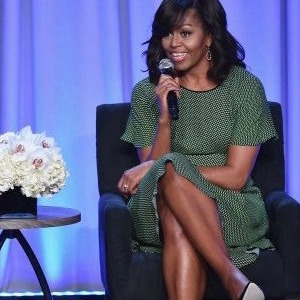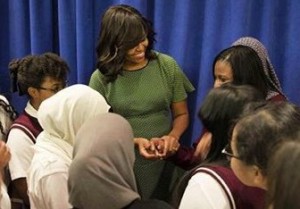
I admit to getting star-struck in the face of celebrity and First Lady Michelle Obama did not disappoint when the chance arose to see her in person earlier this month at Next Up, the American Magazine Media Association Conference in Manhattan.
FLOTUS knows how and when to use humor. She’s not afraid to try entertainment to get her message across — whether it’s making a 6-second Vine about a turnip, or rapping about going to college to get knowledge.
This graduate of Princeton and Harvard Law School is dead serious about the power of education to change lives – including her own. Addressing the audience of publishing’s elite, she hammered home the importance of sharing her story and determination with other young people — particularly black girls — who might think a life like hers was out of their reach.
“Some teachers doubted that a girl like me – a black girl from the south side of Chicago – could go to Princeton or get into Harvard … Our job is to push past those doubters and find those caring adults who see the positive in us.

“As young women we have to find those people in our lives. When we do achieve, we have to reach back and help others… You have to help another young person find that for herself. We’ve got too many problems to have half our population go without … we need you smart and confident in your abilities.”
Obama said her working-class parents never went to college but always believed in her. To illustrate her humble beginnings, she talked about sharing a bedroom with her brother, which her parents partitioned off using a temporary wall to create separate spaces for the children. She persevered, and sometimes did her homework at 4 a.m. because that’s when the apartment building was quietest.
The first lady headlined a panel called “Media With Purpose” — which also included actors Lena Dunham and Julianne Moore. Dunham talked about her desire to educate women about health issues such as endometriosis with her newsletter Lenny, produced under the Hearst umbrella. Moore, who has made it her mission to use her influence to help strengthen gun laws, said she would never have considered being an actor if not for a high school teacher who saw her potential and told her so.
Obama gave a plug for the power of a print magazine cover and a lesson in how to use influence. Social media can create the buzz, but print can still provide unparalleled ability to go in-depth.
Four leading publishers — Hearst, Conde Nast, Time Inc. and Meredith — thanked Obama with a combined $9 million in free public service advertising to support her #LetGirlsLearn initiative. While it wasn’t a direct quid-pro-quo, the first lady’s time and drawing power helped to benefit her mission.
Obama guest-edited the July/August issue of MORE magazine and used the opportunity to support the cause, which aims to help the #62milliongirls around the world who are deprived of an education. She flew to Cambodia with MORE editor-in-chief Lesley Jane Seymour and a team to create a spread and noted it is the first time her mom ever paid attention to something she produced. Her mom grabbed the magazine and went up to her room to read it cover to cover.
“She doesn’t read my speeches or look at my clips. She read MORE,” Obama said.
One of the most academically accomplished first ladies, Obama said she and her husband will continue to support #LetGirlsLearn after they leave the White House.
The impact of 62 million girls not being in school results in higher rates of HIV, lower wages, and causes a ripple effect for the entire world economy.
Girls who are educated earn more money, raise healthier families and for every extra year of secondary education, see their earnings increase by 15 percent. This means more empowered people buying goods, spending resources, learning and traveling.
“We’re blessed to be in a country where kids have access to school,” Obama said. “We want to make sure they’re empowered to take advantage of the resources they have and develop the skills so they can be part of making change.
“When you’re the first lady, or an actress, larger than life to many girls living in poor communities, you seem untouchable. They look at you and think, ‘There’s no way I could be her. There must have been some magic, some luck, some charm.’ For me it is so important for kids to understand that I was them. They are me. It is so important they connect to me so they can see themselves in me and push all that impossibility out of their heads.
“With hard work, dedication and investment they can achieve. It’s still not impossible… we have to be vulnerable and tell our stories in an honest and authentic way. You can’t do that if you’re not willing to connect and share. It makes us more human.”
